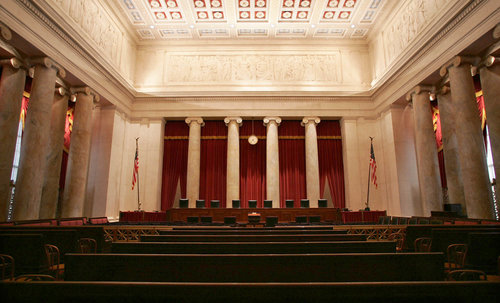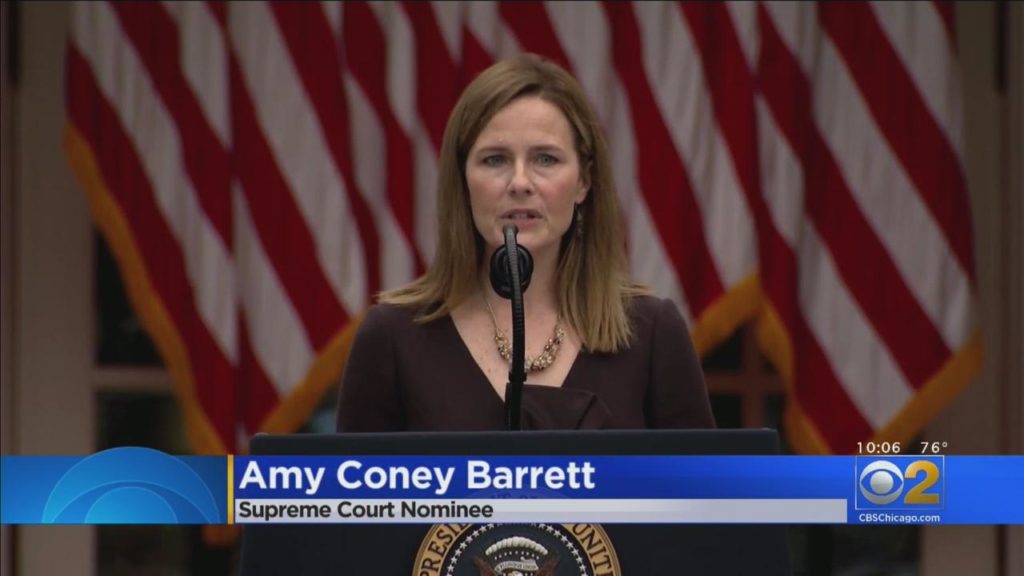
I sat in this chamber twice. The first occasion was listening to the Supreme Court hear arguments. I don’t remember the case. My presence there, in 1981, was while I was interning at the Court’s history office as I worked on my doctorate at The American University. The second time was in early 1999 at a conference on constitutional history. Attendees were then served dinner at the Court.
Of all the institutions set up by the Constitution, the Court is supposed to be the least affected by politics. How that has changed in our day. Looking past Franklin Roosevelt’s failed attempt to pack the Court in 1937, we can see the extreme politicization arriving in earnest when Ronald Reagan’s nominee, Robert Bork, was subjected to such partisan smearing that he lost his bid to serve as one of the justices. Those hearings led to a new word in our political vocabulary—Borking.
Clarence Thomas suffered through accusations as well, as an attempt was made to undermine his character. He survived and has become a stalwart vote for constitutionalism during his tenure. The not-so-secret reason for the politicization of the Court is abortion. Liberals want to protect the Roe v. Wade decision; conservatives want to see it overturned. Therefore, every new vacancy on the Court leads to a political battle.
I am unapologetically on the side of seeking to stop all abortions. However, unlike some conservatives, I don’t think that overturning Roe is the be-all and end-all of the atrocity that kills innocent babies. Even if it were to be overturned, individual states that have liberal abortion policies would continue to have them. The fight would go on.

The controversy this time is due to the death of Ruth Bader Ginsburg, a staunch liberal whose vote on issues like abortion would always be consistent. Both Republicans and Democrats have exhibited crass hypocrisy over the timing of the new nomination, that of Amy Coney Barrett.
Back in 2016, President Obama, to fill a vacancy created by the death of conservative justice Antonin Scalia, nominated Merrick Garland to take his place on the Court. Garland, while apparently not an ideologue, nevertheless would not have seen the Constitution in the same way as Scalia. Republicans in the Senate (and they had the majority) determined not to go forward with the nomination. They argued that it would be wrong to do so in an election year, especially when, if confirmed, Garland would change the complexion of the Court. Democrats vehemently disagreed with this, and when Brett Kavanaugh was later nominated by Trump, they not only put him through a terrible grind, but laced it with the idea that he would be taking a seat “stolen” from Garland.
Now the tables are turned. In this election year, Republicans have no problem going forward with a confirmation of someone who will change the complexion of the Court, while Democrats decry going forward at all because they hope Joe Biden will win and give them a nominee in the ideological image of Ginsburg.
Hypocrisy abounds on both sides.
My goal is to be consistent about what the Constitution says in these matters. It’s not hard to find the section that lays it out clearly. Article II, Section 2, deals with the powers of the presidency and, in this case, also says what the role of the Senate shall be. Here’s the pertinent part:
He shall have Power, by and with the Advice and Consent of the Senate, to make Treaties, provided two thirds of the Senators present concur; and he shall nominate, and by and with the Advice and Consent of the Senate, shall appoint Ambassadors, other public Ministers and Consuls, Judges of the supreme Court, and all other Officers of the United States, whose Appointments are not herein otherwise provided for, and which shall be established by Law . . .
There is no limitation there as to when the president can nominate a Supreme Court justice. Neither is there any limitation as to when the Senate shall proceed with its role of advising and consenting to the nomination. Nothing is said about not doing this in an election year. Nothing is said about waiting until the election is past. A president can nominate at any time, and the Senate can choose whether to proceed with a nomination—or not. It has the authority to say yes or no to that nomination.
Therefore, President Trump is within his constitutional right to nominate now, and the Senate can proceed as it sees fit, just as President Obama was within his constitutional right to do the same in 2016; similarly, the Senate had every right to decide whether it wanted to take up that nomination.
The Constitution—that hardy little document that keeps wanting to intrude upon politics—should prevail.

I’ve read about Amy Coney Barrett over the past years. I’m impressed with her constitutional grounding. She served as a clerk for Antonin Scalia, who is obviously one of her mentors. In my view, she will be a valuable addition to the Supreme Court and I urge the Senate to proceed and place her on the bench. If she stays true to her philosophy, she will be a benefit to the nation.
Naturally, I’m also heartened by what seems to be her steadfast Christian faith. Yes, I want faith-filled people serving in all areas of our government, not to set up a theocracy (an invalid accusation) but to help infuse our government with Christian character and morality.
Keep in mind, though, that if she is true to her judicial philosophy, she will look at every case from that perspective and may not always do what conservatives want. She will have to abide by the law in her decisions. If confirmed, the Court will have more conservatives than before, but for those of us who want to end abortion, we need to realize that at the moment, only one of those conservatives (Thomas) is willing to go on record as opposing the decision made in Roe.
Getting a conservative Supreme Court is not the solution for our nation. The Christian witness in our culture is the key to turning things around. Don’t ever raise politics to the level that Christian faith should have in our lives. When we align too much with any political party or movement, we may eventually damage that Christian witness. We may win politically and lose spiritually.
I endorse the confirmation of Amy Coney Barrett. Please don’t consider that endorsement as a political endorsement as this election approaches.
